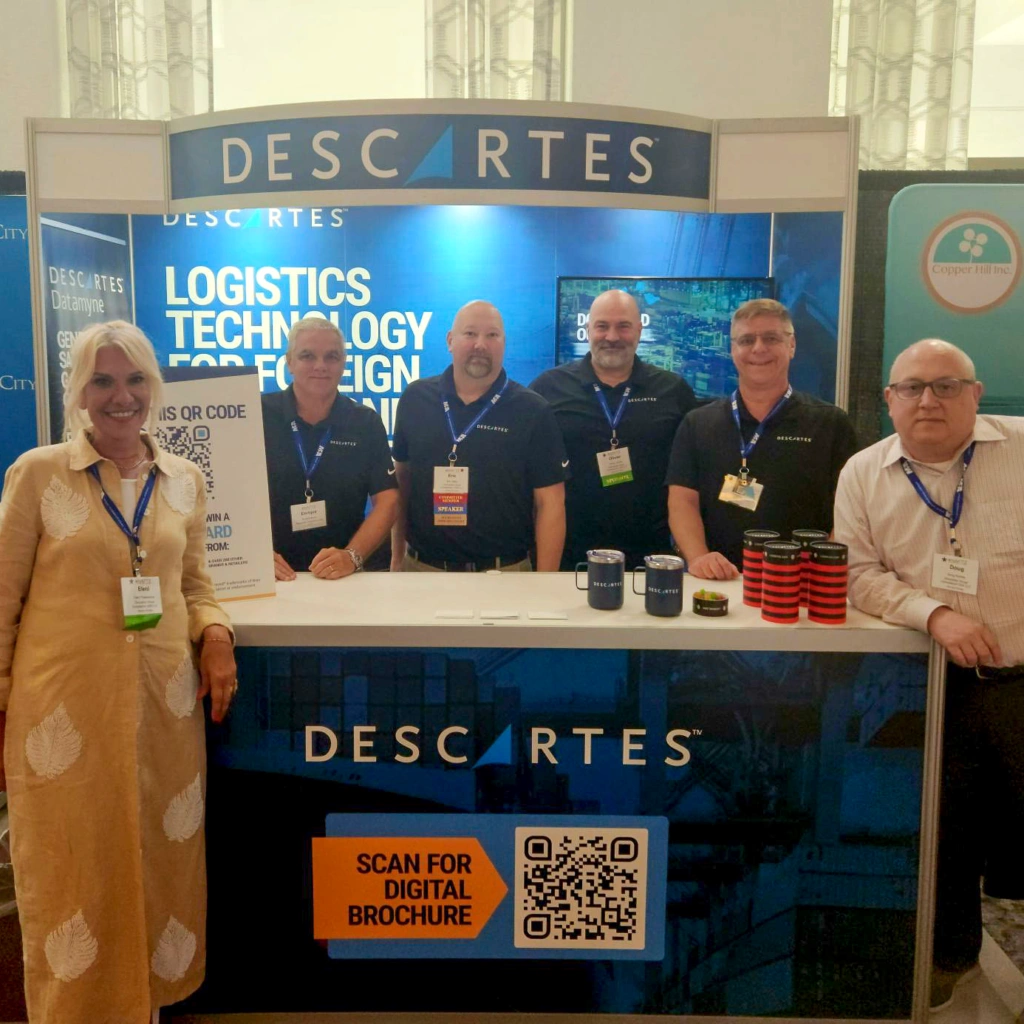Written by Eleni Thalassinos, Director, Business Development and Partnerships, Global Trade Intelligence, Descartes Systems Group
The 2023 NAFTZ Annual Conference highlighted challenges in adhering to regulatory requirements within Foreign Trade Zones.
I had the opportunity to attend the 4-day Conference in Miami, Florida, which hosted more than 500 attendees from approximately 300 companies involved in the foreign trade zone (FTZ) community and to connect with attendees from Legal roles, FTZ consultants, Grantees, Brokers as well as companies operating their own zones. It was emphasized that knowledge, expertise, and experienced personnel are required in order to be compliant with the multitude of regulations in place and to ensure that the flow of goods move seamlessly through supply chains.
One conversation I had summed up the consensus among many attendees. “I thought that dealing with Foreign Trade Zones was inherently difficult because that’s how it’s always been like for me and that’s how I thought it would likely stay. But in attending the NAFTZ Annual, I understand how much easier the work can be accomplished with software”.
Key Takeaways
- Challenges to find experienced personnel in the FTZ space.
- The business world operates at an increasingly fast pace and within the confines of a growing body of regulations.
- To get the full benefits of operating in a Foreign Trade Zone, organizations need a robust FTZ software solution to assist with the challenges they face.

Descartes Systems Group’s Eleni Thalassinos, Enrique Brum, Eric Dalby, Olivier Joncas, Tom Kuerbs, and Doug Kuhles at the NAFTZ Annual 2023 conference in Miami, Florida
The Role of Technology in Foreign Trade Zone Management
FTZs serve as vital hubs for businesses in international trade, seeking to navigate the complexities of global commerce while optimizing their operations and minimizing costs. In several NAFTZ sessions, we heard that to effectively manage operations within these zones and ensure unwavering compliance with regulatory requirements, companies are increasingly turning to specialized FTZ software solutions.
The Key Components of FTZ software
Below are six key components that make up a robust FTZ software solution.
- Efficient Compliance Management: FTZs are subject to a labyrinth of rules and regulations. FTZ software serves as a guiding hand, automating processes and ensuring meticulous record-keeping to minimize the risk of incurring non-compliance penalties.
- Optimized Inventory Control: A primary advantage of FTZs is the ability to exercise tighter control over inventory. FTZ software is your Inventory Control and Recordkeeping System (ICRS) and enables real-time tracking, reporting, and management of inventory within the zone, significantly reducing errors and enhancing operational efficiency.
- Seamless Customs Reporting: FTZs demand detailed and timely reporting to CBP. FTZ software generates accurate reports, ensuring that the requisite information reaches authorities promptly and in the prescribed format.
- Elevated Security Measures: FTZ software aids in managing access controls, monitoring security incidents, and creating comprehensive audit trails to bolster overall security.
- Cost Efficiency: FTZs offer significant opportunities for cost savings. FTZ software streamlines operations, reducing administrative overhead and ensuring that businesses can fully capitalize on the cost advantages of operating within a zone.
- Scalability: As businesses grow, the intricacies of their FTZ operations may increase. FTZ software should have the flexibility to scale with the business, accommodating rising volumes and more demanding supply chain requirements.
In Conclusion
FTZ software plays an instrumental role in upholding compliance within Foreign Trade Zones. To succeed in the global marketplace, businesses operating within FTZs should strongly consider the FTZ software as a strategic investment, bolstering compliance, security, and cost-efficiency while paving the way for sustainable growth and success.
How Descartes Can Help
Developed to meet the specific needs of FTZ operators and tenants, the Descartes FTZ software solution provides continuous automation for repetitive tasks, a flexible deployment, regulation compliance and reporting, trading partner connectivity, item level management, error targeting and dashboard visibility.
To further reduce data redundancy, the solution incorporates information-sharing capabilities with import, export, customs house brokers, and freight forwarding components. Electronic connectivity to regulatory agencies enables seamless electronic customs document filing and clearance. The Descartes FTZ solution can be used with existing warehouse management systems, or a system provided by Descartes. For more information, Contact Us.
Find out what our customers are saying about us on G2 – an online third-party business software review platform.


